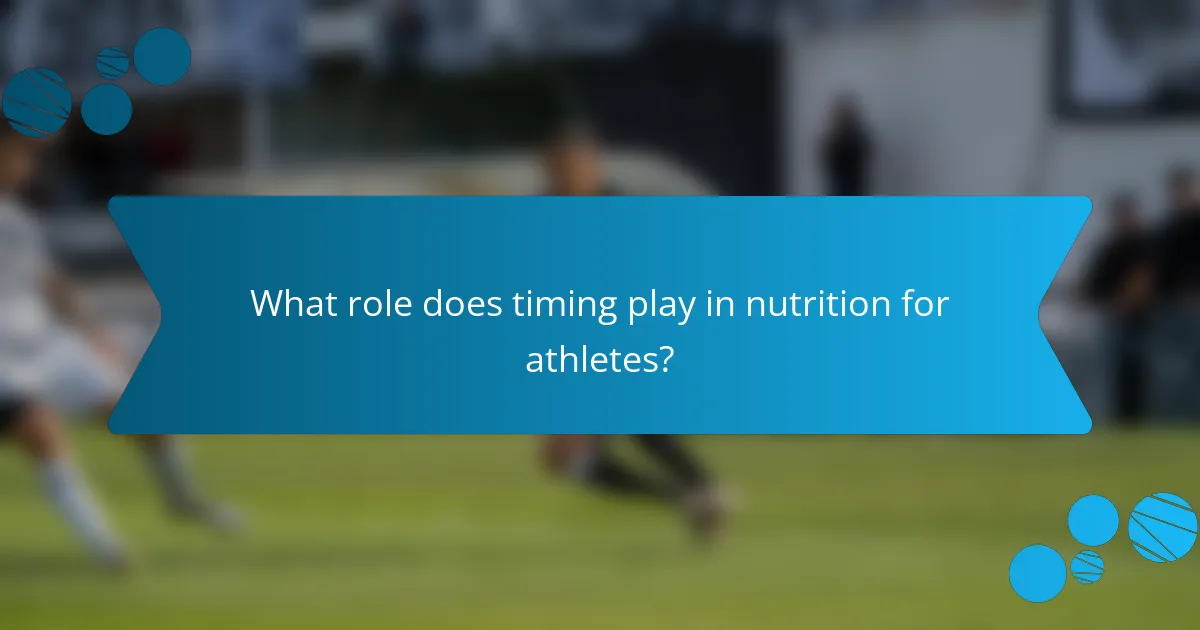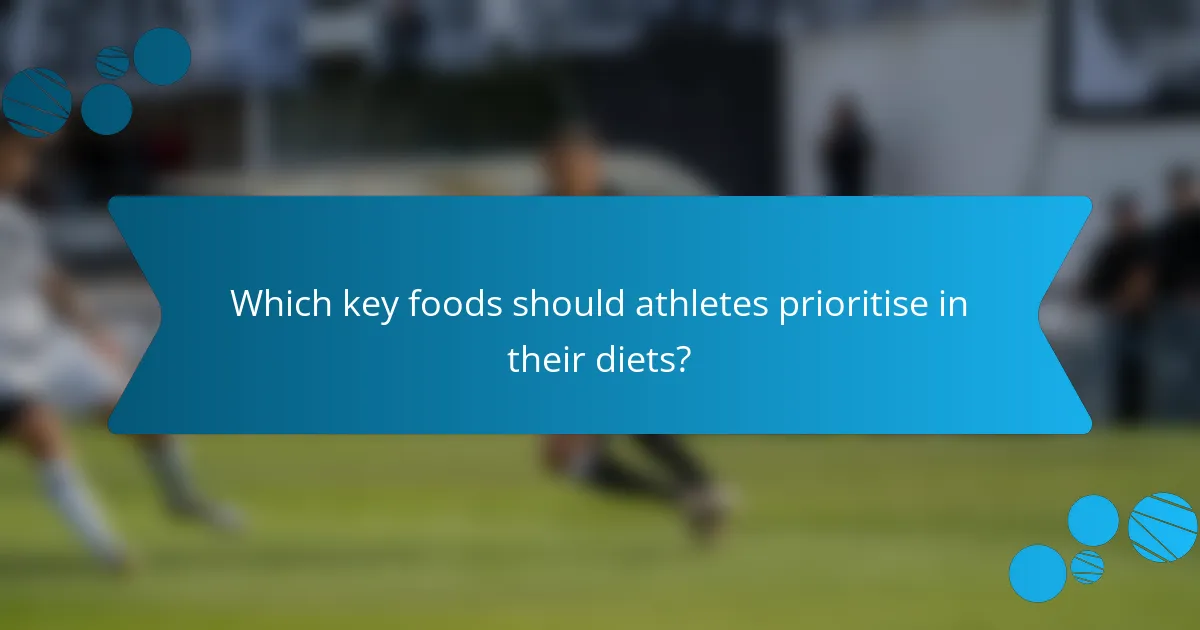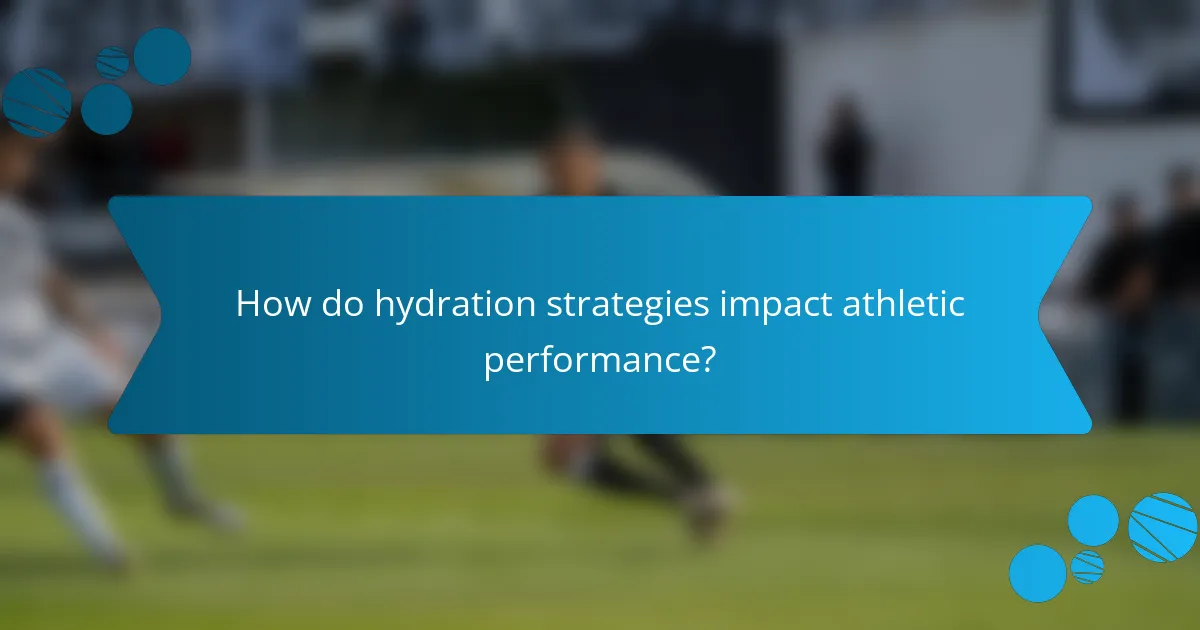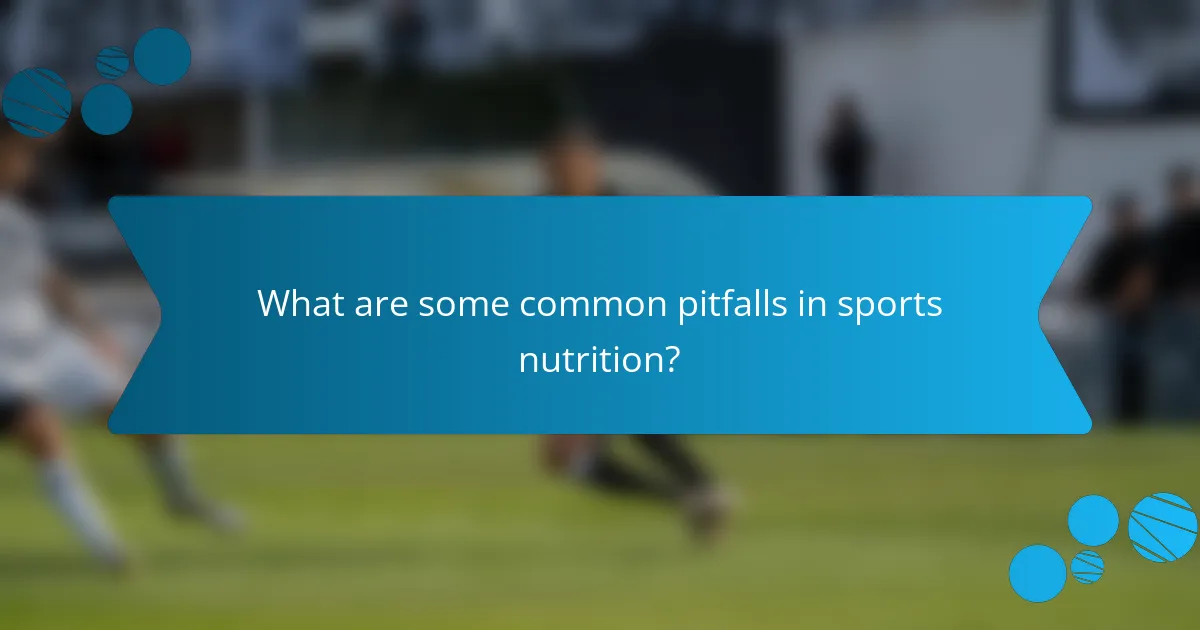Optimising nutrition strategies is crucial for athletes seeking to enhance performance. Key foods like carbohydrates, proteins, and healthy fats play significant roles. Meal timing around training sessions maximises energy and recovery. Hydration and personalised dietary considerations further support athletic goals and overall health.

What are the fundamental nutrition strategies for enhancing athletic performance?
Nutrition strategies for enhancing athletic performance focus on key foods and optimal timing. Prioritising carbohydrates, proteins, and healthy fats is essential. Carbohydrates fuel workouts, while proteins support muscle repair. Timing meals around training sessions maximises energy and recovery.
1. Carbohydrate-rich foods: Whole grains, fruits, and vegetables provide sustained energy.
2. Protein sources: Lean meats, dairy, and legumes aid muscle recovery and growth.
3. Healthy fats: Nuts, seeds, and avocados support overall health and energy levels.
4. Hydration: Water and electrolyte-rich beverages enhance performance and recovery.
5. Meal timing: Consuming meals 2-3 hours before training optimises energy levels.
Implementing these strategies can significantly enhance athletic performance and overall health.
How do macronutrients influence energy levels during athletic activities?
Macronutrients significantly influence energy levels during athletic activities by providing the necessary fuel for performance. Carbohydrates serve as the primary energy source, replenishing glycogen stores and sustaining endurance. Proteins contribute to muscle repair and recovery, while fats offer a concentrated energy source for prolonged activities.
Carbohydrates, particularly complex ones, should be consumed before and during exercise to maintain blood glucose levels. For example, athletes often consume pasta or rice before events. Proteins, such as lean meats or dairy, are crucial post-exercise to aid muscle recovery. Fats, like avocados or nuts, are beneficial for longer-duration activities, providing sustained energy.
The timing of macronutrient intake also plays a crucial role. Consuming carbohydrates within 30 minutes post-exercise can enhance recovery. A balanced approach, tailored to individual needs, optimises energy levels and performance during athletic activities.
Which micronutrients are critical for optimal athletic function?
Micronutrients critical for optimal athletic function include vitamins and minerals that support energy production, muscle function, and recovery. Key micronutrients are calcium, magnesium, iron, and vitamins D and B12. Calcium is essential for muscle contractions, while magnesium aids in energy metabolism. Iron is crucial for oxygen transport, and vitamins D and B12 support bone health and red blood cell production, respectively.

What role does timing play in nutrition for athletes?
Timing significantly influences nutritional effectiveness for athletes. Consuming specific nutrients at strategic times enhances performance and recovery.
Pre-exercise nutrition focuses on carbohydrates and protein to fuel activity. Consuming these nutrients 1-3 hours before exercise maximises energy levels.
Post-exercise, protein intake aids muscle repair. Consuming protein within 30 minutes to 2 hours after exercise optimises recovery.
Hydration timing is critical as well. Athletes should hydrate before, during, and after exercise to maintain performance and prevent dehydration.
When should athletes consume carbohydrates for peak performance?
Athletes should consume carbohydrates before, during, and after exercise for optimal performance. Pre-exercise intake enhances energy levels, while during-exercise consumption maintains stamina. Post-exercise carbohydrates aid recovery and glycogen replenishment. Timing and quantity are crucial; aim for 1-4 grams of carbohydrates per kilogram of body weight in the hours leading up to an event. This strategy maximises energy availability and supports endurance.
How does protein timing affect muscle recovery and growth?
Protein timing significantly enhances muscle recovery and growth by optimising nutrient availability. Consuming protein shortly after workouts promotes muscle repair and synthesis. Studies indicate that a post-exercise intake of 20-30 grams of protein can maximise muscle protein synthesis. This strategy capitalises on the body’s heightened sensitivity to nutrients during recovery, leading to improved outcomes. Additionally, distributing protein intake evenly throughout the day supports sustained muscle growth.
What are the benefits of pre- and post-workout nutrition?
Pre- and post-workout nutrition enhances athletic performance by optimising energy levels, recovery, and muscle growth. Proper nutrient timing ensures glycogen replenishment and muscle repair, leading to improved endurance and strength.
Key benefits include:
1. Increased energy levels during workouts.
2. Enhanced muscle recovery post-exercise.
3. Improved protein synthesis for muscle growth.
4. Reduced risk of injury and fatigue.
5. Better hydration and electrolyte balance.
These strategies support overall athletic performance and can lead to significant gains in fitness outcomes.

Which key foods should athletes prioritise in their diets?
Athletes should prioritise whole grains, lean proteins, fruits, vegetables, and healthy fats in their diets. Whole grains provide essential carbohydrates for energy. Lean proteins, such as chicken and fish, support muscle repair and growth. Fruits and vegetables offer vital vitamins and minerals, enhancing overall health. Healthy fats, like avocados and nuts, contribute to sustained energy levels. These food groups collectively enhance athletic performance and recovery.
What are the top sources of complex carbohydrates for endurance athletes?
The top sources of complex carbohydrates for endurance athletes include whole grains, legumes, fruits, vegetables, and starchy foods. Whole grains like brown rice and quinoa provide sustained energy. Legumes such as lentils and beans offer fibre and protein. Fruits, particularly bananas and berries, supply vitamins and minerals. Vegetables like sweet potatoes and carrots are nutrient-dense options. Starchy foods, including oats and whole grain pasta, are excellent for energy replenishment. These foods support performance and recovery by offering essential nutrients and prolonged energy release.
How do healthy fats contribute to sustained energy for athletes?
Healthy fats provide sustained energy for athletes by offering a concentrated source of calories and promoting efficient fat oxidation. They help maintain stable energy levels during prolonged exercise, reducing reliance on carbohydrates. For example, avocados and nuts deliver essential fatty acids that support endurance and recovery. Additionally, healthy fats can improve nutrient absorption, enhancing overall performance. Incorporating sources like olive oil and fatty fish can be beneficial for athletes seeking long-lasting energy.
Which protein sources are most effective for muscle repair?
Whey protein and casein are the most effective protein sources for muscle repair. They provide essential amino acids, crucial for recovery and muscle synthesis.
Whey protein is rapidly absorbed, making it ideal post-workout. It contains about 24 grams of protein per serving and is rich in branched-chain amino acids (BCAAs). Casein, on the other hand, digests slowly, providing a sustained release of amino acids over several hours, with approximately 25 grams of protein per serving.
Eggs are another excellent source, offering high-quality protein and essential nutrients. They contain about 6 grams of protein per egg and provide a unique combination of vitamins and minerals that support overall health.
Plant-based options like soy and pea protein are effective as well. Soy protein provides all essential amino acids and contains about 20 grams per serving, while pea protein offers about 15 grams and is rich in branched-chain amino acids, supporting muscle repair.

How do hydration strategies impact athletic performance?
Hydration strategies significantly enhance athletic performance by improving endurance and reducing fatigue. Adequate fluid intake maintains optimal physiological function, ensuring efficient muscle contraction and temperature regulation. Studies show that even a 2% loss in body weight from dehydration can impair performance.
Key hydration strategies include pre-hydration, consistent fluid intake during activity, and post-exercise rehydration. For endurance athletes, consuming electrolyte-rich drinks can replenish lost minerals and enhance recovery. Timing is crucial; athletes should hydrate before, during, and after exercise to maximise performance benefits.
What are the best practices for electrolyte balance during competitions?
To maintain electrolyte balance during competitions, athletes should focus on hydration, sodium intake, and timing of consumption. Proper hydration before, during, and after events is essential to prevent dehydration. Sodium helps retain fluid in the body, so including electrolyte-rich foods or drinks can be beneficial. Consuming these electrolytes at regular intervals during competition enhances performance and recovery.
How can athletes optimise their fluid intake before, during, and after exercise?
Athletes can optimise fluid intake by consuming appropriate amounts before, during, and after exercise. Hydration strategies include drinking 500-600 mL of water two to three hours before exercise, 200-300 mL every 10-20 minutes during activity, and replenishing with 1.5 litres for every kilogram of body weight lost after exercise. This approach helps maintain performance and aids recovery. Monitoring urine colour can also indicate hydration status, aiming for a light yellow shade.

What unique dietary considerations exist for athletes in different sports?
Athletes in different sports have unique dietary considerations based on their specific energy demands and performance goals. Endurance athletes require higher carbohydrate intake for sustained energy, while strength athletes focus on protein for muscle repair.
Sports like swimming and cycling benefit from hydration strategies to maintain performance during long sessions. In contrast, weight-class sports may necessitate calorie restriction to meet weight requirements.
Timing of nutrient intake is crucial; athletes often consume carbohydrates before events for quick energy and protein post-exercise to aid recovery.
Additionally, individual variations, such as metabolic rates and dietary preferences, further influence nutritional strategies, making personalised plans essential for optimal performance.
How do endurance athletes’ nutrition needs differ from strength athletes?
Endurance athletes require higher carbohydrate intake for sustained energy, while strength athletes focus on protein for muscle repair. Endurance training depletes glycogen stores, necessitating 6-10 grams of carbohydrates per kilogram of body weight daily. Strength athletes benefit from 1.6-2.2 grams of protein per kilogram to enhance muscle synthesis. Timing of nutrient intake is crucial; endurance athletes often consume carbohydrates before and during long sessions, whereas strength athletes prioritise protein post-workout for recovery. Hydration strategies also differ, with endurance athletes needing to replenish electrolytes lost through sweat more frequently.
What specialized diets are popular among elite athletes?
Elite athletes often adopt specialised diets such as ketogenic, paleo, and plant-based to optimise performance. These diets enhance energy levels, recovery, and overall health.
The ketogenic diet emphasises high fats and low carbohydrates, promoting fat as the primary energy source. Athletes like cyclists and marathon runners have reported improved endurance.
The paleo diet focuses on whole foods, avoiding processed items. This diet supports muscle recovery and reduces inflammation, benefiting strength athletes.
Plant-based diets, rich in fruits, vegetables, and whole grains, provide essential nutrients and antioxidants. Many elite athletes find these diets enhance their stamina and reduce injury risk.
In summary, specialised diets tailored to individual needs can significantly impact athletic performance and recovery.

What are some common pitfalls in sports nutrition?
Common pitfalls in sports nutrition include inadequate hydration, poor timing of nutrient intake, and reliance on processed foods. Athletes often overlook hydration, which can lead to decreased performance. Consuming nutrients at the wrong times, such as missing post-workout recovery meals, can hinder recovery and muscle repair. Additionally, relying heavily on processed foods may lack essential nutrients, affecting overall health and performance. Addressing these issues can enhance athletic performance significantly.
What mistakes do athletes often make regarding meal planning?
Athletes often make mistakes in meal planning that hinder performance. Common errors include neglecting macronutrient balance, failing to time meals around workouts, and underestimating hydration needs.
Many athletes overlook the importance of carbohydrates for energy, which can lead to fatigue. Additionally, they may not consume enough protein for muscle repair, especially post-exercise. Skipping meals or relying on convenience foods can also result in inadequate nutrient intake.
Another frequent mistake is not adjusting caloric intake based on training intensity. Athletes need to tailor their meal plans to match their activity levels, ensuring they consume sufficient calories to support recovery and performance.
Lastly, many athletes ignore the timing of meals and snacks. Consuming food too close to training can cause discomfort, while not eating soon after exercise can impede recovery. Proper meal timing enhances energy levels and aids in muscle recovery.
How can athletes avoid the dangers of fad diets?
Athletes can avoid the dangers of fad diets by focusing on balanced nutrition and individualised meal plans. Prioritise whole foods rich in nutrients, including lean proteins, whole grains, fruits, and vegetables.
Monitor macronutrient ratios tailored to specific training needs. For example, endurance athletes may require higher carbohydrates, while strength athletes benefit from increased protein.
Stay informed about dietary trends and consult with nutrition professionals to ensure sustainable practices. Avoid restrictive diets that eliminate entire food groups, as they can lead to nutrient deficiencies and negatively impact performance.
Regularly assess energy levels and recovery to adjust dietary strategies effectively. This approach promotes optimal athletic performance without the risks associated with fad diets.

What are the emerging trends in sports nutrition for 2025?
Emerging trends in sports nutrition for 2025 focus on personalised nutrition strategies, plant-based diets, and advanced supplementation. Athletes increasingly seek tailored meal plans that consider individual genetics, microbiome, and performance goals.
Plant-based foods are gaining traction due to their health benefits and sustainability. Nutrient-dense options like legumes, whole grains, and vegetables are being prioritised for their ability to enhance recovery and performance.
Advanced supplementation, including adaptogens and nootropics, is becoming popular for improving focus and resilience. Ingredients like ashwagandha and rhodiola are recognised for their potential in reducing stress and enhancing endurance.
Timing of nutrient intake is also evolving. Athletes are adopting strategic meal timing to optimise energy levels, recovery, and muscle synthesis, emphasising pre- and post-workout nutrition.
How is technology influencing athletes’ nutritional strategies?
Technology is significantly enhancing athletes’ nutritional strategies by providing personalised data and insights. Wearable devices track biometrics, allowing for tailored meal plans based on real-time performance metrics. Apps help athletes monitor their nutrient intake and hydration levels, ensuring optimal fuelling. Additionally, advancements in food science have led to the development of supplements that cater to specific training needs, such as recovery or endurance. This data-driven approach enables athletes to optimise their nutrition for peak performance, making informed decisions about food timing and composition.
What innovations in food science are shaping athletic diets?
Innovations in food science are revolutionising athletic diets by enhancing nutrient absorption and optimising performance. Personalised nutrition, utilising genetic data, tailors diets to individual needs, improving energy levels. Functional foods, rich in bioactive compounds, support recovery and reduce inflammation. Advances in food technology, like plant-based protein sources, provide sustainable options for athletes. Moreover, timing strategies, such as nutrient timing around workouts, maximise muscle recovery and growth. These innovations collectively contribute to improved athletic performance and overall health.
Which expert tips can help athletes optimise their nutrition for better performance?
Athletes can optimise their nutrition by focusing on macronutrient balance, meal timing, and hydration. Key strategies include consuming adequate carbohydrates for energy, protein for muscle repair, and healthy fats for overall health.
1. Prioritise complex carbohydrates such as whole grains and fruits to fuel performance.
2. Incorporate lean proteins like chicken, fish, and legumes to support muscle recovery.
3. Schedule meals and snacks around training sessions to maximise energy availability.
4. Stay hydrated with water and electrolyte-rich beverages to maintain performance levels.
Using these strategies can significantly enhance athletic performance and recovery.